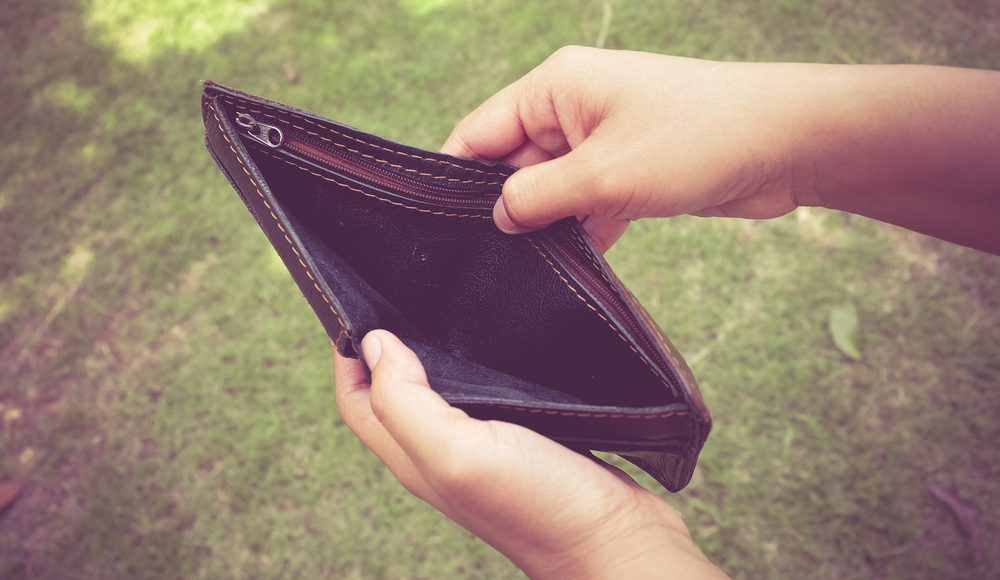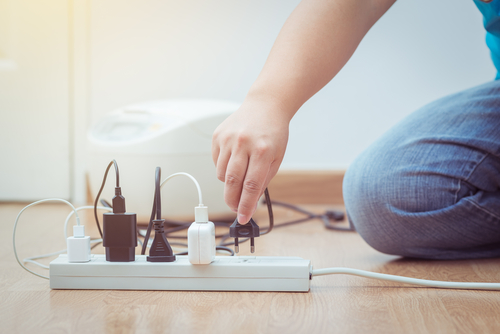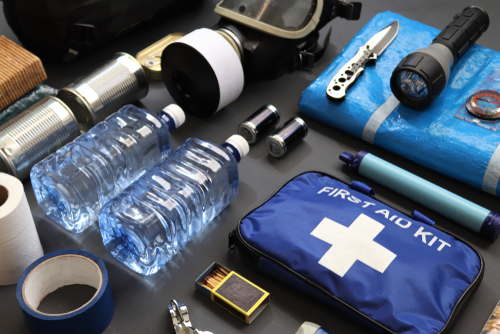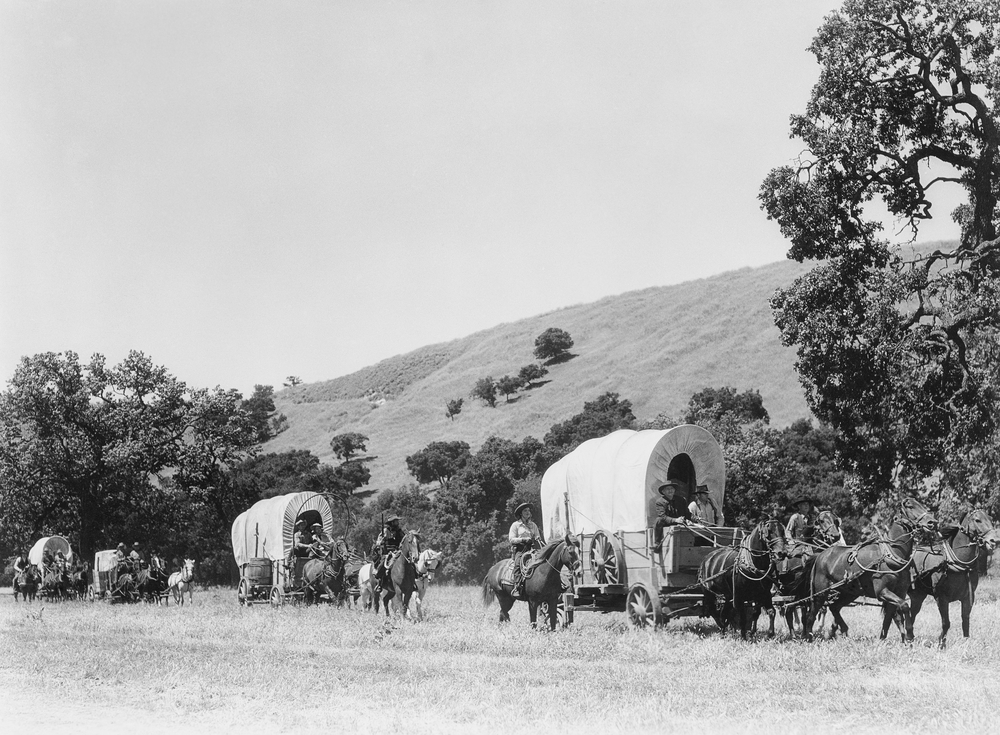Even though there are definite signs that the overall economy is improving, individuals are still struggling with problems caused by prices going up just as fast.
While improving foreign trade deals is very important for the long term financial future of individuals and families right along with our nation, the short term costs can be debilitating to those who are living on limited amounts of money.
If you have 1500.00 per month after taxes per individual in your home, here is a budget that may make it easier to manage current expenses as well as prepare for future problems.
Shelter (Max 400.00)
As of June 2018, the average cost of rent in the United States is a little over 1400 per month[1]. Unless you have 3 – 4 wage earners in your home that bring home at least 1500 per month, the average cost of an apartment will be well beyond your means unless the following conditions are met:
- Rent must also cover utilities, electricity, heat, water, and the internet, which would bring your rent budget up to 715.00. It must also be centrally located so that you can shop and take care of other needs without owning a motor vehicle or using a cab more than once or twice a month, bringing your budget amount up to 795.00. If you do not have pets, are able to drop all insurances, are in good health, and can grow your own food in the apartment, it will be possible, but extremely difficult for you to make ends meet.
- You have an option to do work for the landlord that will enable you to reduce the actual cost of your rent to around 400.00 per month, or a bit higher if utilities or other services are included.
- You are able to sublet or run a business that will help you defray the cost of renting the apartment to a point where you are only contributing 400.00 worth of your initial income into paying the rent.
If you are looking for the lowest cost shelter options, you can do some research on different areas, and see what kinds of apartments are available. You may need to move to another state (such as Arkansas which has the lowest average rent for a one-bedroom apartment[2]), as well as look for ways to combine other items in your budget in order to come up with enough money to cover the cost of shelter plus those items.
Interestingly enough, the average cost of a mortgage per month is less than the cost of rent[3]. In this case, finding 3 – 4 people willing to cosign the mortgage may be a better option than looking for a rental agreement. Just make sure that you choose a location where you will be free to grow your own food, generate your own electricity, and embrace off gridding if you so choose. In general, you will be better off looking for cheaper rates in small towns or other locations that are having a hard time attracting consumers. If you decide to go into buying a home with other people, do not forget to factor in the cost of upkeep and maintenance. Ideally, at least one or two people buying into the home with you should be capable of doing a wide range of repairs so that you can save at least some money on those items.
Food (Max 80.00)
In 2017, the average cost of food per person was around 250.00 per month[4]. Trade tariffs with China, as well as problems with other trading partners, could easily cause the price of food to double. Weather patterns throughout the United States have already led to 2 or more missed crops and are threatening the current spring season. If the storm patterns continue, it is entirely possible that some farms will miss four or more crops in regions that are absolutely essential for food production. This will drive up the cost of meat and dairy products right along with plant-based foods because the cost of feeding farm animals will also skyrocket. While the government may be able to cushion some of the monetary cost of trade wars with subsidies to the farms, it cannot compensate for crops that aren’t grown. Or, more simply put, if there are no bean plants growing, no amount of money will be able to generate a can of beans. Here are some ways to reduce food cost:
- Usually, the most expensive foods you can buy contain meat or dairy. Limit meat intake to no more than once per week, and eliminate dairy. Beans, nuts, and other plant-based foods can meet all of your nutritional needs and cost much less at the same time.
- Make your own bread using sourdough starters. One 5 pound bag of flour costs well under 2.00 and will make about 7 – 8 loaves of bread. If you use a sourdough starter, the cost of bread per week will be very low, even if you bake every day. Bread can also be baked in a solar oven, which makes it even cheaper when compared to purchasing commercial bread. As an added bonus, when you make bread at home, you will have a much better tasting bread with far fewer (if any) additives and preservatives. You can also add fruits, grains, or other items to the bread to make it taste better, as well as for pairing with other menu items.
- Use indoor planting containers combined with fast-growing, nutrient-dense items such as spinach, carrots, broccoli, turnips, beets, zucchini, and broadleaf plantain. Within just 45 – 60 days, you can have enough food growing in 2 or 3 containers to make a full meal, or add to several meals. The key to sustainable food production in containers isn’t so much about growing many plants at one time as it is staggering the plantings so that you always have something ready to eat while other plants are growing. Do not forget to let at least some plants go to seed and make sure that they are properly pollinated so that you do not have to spend money on more seeds.
- Grow and harvest wild edibles. It does not matter whether you grow dandelions, broadleaf plantain, or other edible weeds on your front lawn or elsewhere. These plants are usually more nutrient-rich than foods you buy in the store, and may even reseed themselves from year to year. The more you can rely on nature in your own yard, the easier you will find it to cut back on the food bill.
- Avoid foods that will make you sick and drain your energy. While junk food and soda may seem cheap, they have long term health consequences. The best thing you can do for your budget and your health is to eliminate junk food as quickly as possible.
- If you work or must be away from home during the day – bring a bag lunch and a thermos of coffee or tea.
- Buy dry foods in bulk. Aside from helping you stretch your food budget, dried foods are ideal for hurricanes or other emergencies where you may need nutrient-rich foods that require a minimal amount of preparation. Dried nuts and fruits are ideal for these situations. Make sure that you know how to prepare dried beans and other items that need to be cooked so that you can make good use of them in an emergency.
- With the exception of bread, do all your main cooking for the week in one afternoon. If you have a 5-pound bag of flour, some sugar, and a handful of other ingredients, you can make everything from bread and cookies to pie and gravies. Put a pound of beans in the crockpot, and you will have 3 – 4 servings ready to consume during the week. Everything you make should be easy to heat up, or consumed without further cooking.
Water (Max 80.00 including filtration options)
In 2018, the average cost of water per person ran, on average, 70.00 per month[5]. Unfortunately, this does not take into account the very real need to filter out all kinds of contaminants that come with municipal water supplies. While many of these toxins are used to kill pathogens, the fact is they may not be good for your health. Here are some ways to save money on water:
- On average, each person uses 80 – 100 gallons of water per day. If you can cut that back by just 30 gallons, your water bill will go down by half. Interestingly enough, approximately 20% of daily water use goes to flushing the toilet. To reduce this to 10%, try putting a filled, half-gallon jug in the toilet’s water tank. Each time you flush, there will be half the volume of water going into the bowl.
- Collect rainwater to use for plants and other non-potable needs. Since rainwater may also be heavily contaminated, do not forget to filter it.
- Use a handheld shower attachment or a water-saving showerhead.
- Wash dishes by hand instead of using a dishwasher
- plan meals carefully so that you can reuse water for cooking various items. For example, if you are cooking pasta and vegetables, boil the vegetables first and then reuse the water for the pasta. Depending on what you are cooking, many important nutrients will leach into the water. Instead of wasting it, find a way to incorporate it into a beverage that you can consume with your meal.
- Survey and repair pipes, faucets, fittings, and water hoses to make sure they aren’t leaking. Even a small leak can add up to dozens of gallons in a very short period of time.
Electricity (Max 80.00)
Even though the average use (approximately 900-kilowatt hours per month) may be the same, you may wind up paying double or triple the amount per kilowatt-hour based on where you live[6]. Since the general cost trends are increasing from year to year, your best option for saving money is to cut back on electric usage as much as possible. Here are some ways to achieve that goal:
- Use a solar cooker to prepare meals whenever possible
- Use a solar dehydrator to reduce the need for refrigeration
- Use blinds, curtains, and other passive cooling methods to reduce reliance on the air conditioner
- Ask your electricity provider if you can get on a budget plan. This is especially helpful for controlling the effects of seasonal adjustments to your electric usage.
- Use power strips that enable you to cut power to each outlet on the strip. From power-hungry printers to other devices that may not shut off completely, simply pushing a button on the strip can save you a good bit of money each month.
- Look for surveillance cameras or other appliances that can run on batteries or solar power. When combined with even small solar panel battery chargers, you can save a good bit of money over time.
- During the summer months, use table lamps with efficient bulbs instead of overhead lights. If you must keep overhead lights with multiple bulbs, try to use just one bulb at a time.
- Actively pursue methods to generate electricity on your own. This may include anything from using a bike with a generator on it, solar power, or wind power. There are endless options for both DIY and pre-manufactured systems.
- Washing machines and dryers consume a great deal of energy. Wash clothes by hand or by using a bike with a washing machine it in it, and then hang the clothes out on a laundry. If you do not have two points to string up a laundry line, there are standalone ladder racks, as well as many other designs you can make use of.
- Use fans instead of an air conditioner during the summer months. You can also make what amounts to a bucket dehumidifier that will help reduce air temperatures when combined with a fan.
Heat (Max 80.00)
Depending on the severity of the winter months in your area, the cost for electric, gas, oil, or other forms of heat may cost 100.00 to 300.00 per month.
FREE REVEAL – 20 Best Projects for a post-SHTF World
There are a number of ways to cut back on heating costs, including the following:
- Use passive heating methods such as opening the drapes during day hours to let the heat from the sun in. Follow up with heavy drapes covering the windows when the sun moves to keep the heat in as much as possible.
- Seal off windows, doors, and any area where cold air may be leaking into the home.
- Cut off as many rooms as possible so that you have a smaller area to heat. If the weather is extremely cold, or you cannot keep up with the heating cost, put a tent in one room, and then aim to keep the area inside the tent warm.
- Set ceiling fans on low speed to push warm air back down to the living area.
- Use layers of clothes and blankets to reduce the need for warm air in the room.
- After you are done baking, open the oven so that heat from it can escape, contributing with some warmth to the kitchen.
- Build a tin can solar heater to take advantage of any warmth that may be available on suitable days.
- Use candle heaters or similar devices to heat up small areas instead of a whole room.
- Exchange energy-efficient bulbs for incandescent bulbs in table lamps. The bulbs will generate much-needed heat along with the light.
- Consume hot meals cooked in thermoses or other passive cooking devices
Miscellaneous Utilities (Max 50.00)
Trash bills and other utilities can quickly add up to well over 100.00 per month if you aren’t careful. Depending on where you live, rubbish removal or similar services may be included with your water bill, or you may have the option to choose your own service provider. If you live in an area where rubbish removal is separate, it is very important to make use of the cheapest option available. In order to achieve this, you will need to recycle as much as possible or rely more on reusable household items. Aside from cutting back on the cost of disposable items, you should be able to cut this part of your bill down by a good bit. Here are some options that you can try:
- Eliminate reliance on tin foil, plastic and/or plastic wrap, paper plates, and other disposable household items. Pyrex cookware lasts longer than metal and also exposes you to fewer toxins in the long run. By the same token, storing foods in glass and then reusing the glass will offer the best way to cut back on items that need to be thrown in the trash.
- If you have furniture that cannot be sold or given away, break it down so that it can be fit in your regular trash a little at a time. Even though it may take a few weeks to get rid of larger items, you will not wind up with an extra charge on your rubbish bill.
- Instead of throwing leaves and other yard debris in the trash, start a compost bin. Not only will yard litter makes an excellent fertilizer for indoor gardens, but you can also use the compost pile to generate heat.
Transportation (Max 80.00)
If you thought housing was a hard item to budget for, you may not realize just how hard it is to afford transportation when you only have 1500.00 a month available. In this case, the national average, in 2017, including the cost of gas, was about 750.00 per month[7]. Since past administrations did not see the value of increasing oil production in the United States, problems in the Middle East and Venezuela can easily cause the price of gasoline and diesel to double or more. Considering approximately 1/3 of transportation cost is spent on fuel, monthly costs on this budget item could easily go well over 1000.00 for the average household. Needless to say, if you can barely afford gas and a car now, it won’t be possible when prices go higher. Here are some things you can do to reduce costs as much as possible:
- Unless you are living in your car, chances are you do not have a car loan or lease at this time. If most of your money (outside of the rent) is going for transportation, the best thing you can do is get out of the loan or lease as quickly as possible. Talk with a financial adviser about the impact of allowing the vehicle to be reposed, or turning the vehicle back in. If you are currently spending 500.00 per month on the loan, saving that money for 7 months may enable you to buy a car outright for 3500.00. From there, you can look to mechanics insurance to help defray the costs of any repairs that may come up once the warranty expires.
- While on the topic of warranties, you are better off purchasing mechanic repair insurance as it may cover more items than an extended warranty.
- Consider getting a bicycle as well as moving to an area where you can reach stores by walking.
- Look for work from home options or find a way to live closer to where you work.
- As with mortgages and rent payments, look to buy a vehicle with two or more consigners. Just make sure that you can work out when each person will have the car, as well as the details for carpool shopping or other common needs.
Communications and Entertainment (Max 65.00)
Today, many people spend well over 200.00 per month for combined internet, phone, and cable access. You can reduce this cost by well over half as soon as you can get out of your current contract. Have a look at some of the most efficient and reliable cost-saving options:
- While you may not realize it, most cell phones sold in the United States must be capable of reaching 911 even if there is no SIM or active paid subscription plan associated with the phone. That all being said, you can get a free SIM card and free service via Freedompop.
- Freedompop can give you full cell phone access, however, calls, text, and data can be expensive, especially if you are accustomed to using a tablet or other devices on a regular basis. Your best option here is an unlimited 4G data plan without a contract. If you don’t use much data, you can get plans for as low as 25.00 per month. Once you get the data plan, purchase a compatible hotspot that will allow you to connect multiple devices. You can easily run a desktop, multiple tablets, and your cell phone using the same hotspot. As an added bonus, if the power goes out, you will still have access to everything you normally access via your internet connection. Since hotspots run on batteries, you can also charge them up using solar panels or rechargeable battery packs.
- If you tend to talk on the phone a lot or send texts, look for apps that will allow you to make calls and send texts for free. There are several apps that will even give you a phone number and a free voice messaging service.
- Insofar as TV, the cheapest thing you can do is get a Skywire antenna. These antennas cost about 20.00 and will pull in stations within a 30 – 50-mile radius. Since TV stations usually broadcast HD signals for free, you may just find that the service you get for free with the antenna is better than what you are getting with an expensive cable subscription. Unfortunately, if you live in a rural area or a mountainous region with few transmitters, your selection may be very limited. Before you buy an antenna, do some research on cord-cutting and look at sites that will show you how many broadcasts transmitters are in your area.
- The next device you might find useful is a Chromecast or Anycast device. These devices will broadcast the screen from your tablet or phone to your TV via a wireless signal. As with free phone service, you will find that there are a number of free movie apps that may have a number of movies you will enjoy watching. You can also stream live TV shows, YouTube videos, or anything else that you are able to get on your phone or tablet.
Clothing (Max 10.00)
As trade-related problems continue, many people are expecting an increase in the cost of clothes. Now is the time to buy essentials such as underwear or any items that need replacing in your wardrobe. You can look to thrift stores for second-hand clothes that are durable and in good condition. This is also a good time to recapture or develop new skills in knitting, crochet, and sewing. Contrary to popular belief, you do not need a sewing machine to make blouses and other basic garments. Hand sewing can be just as strong and durable as machine sewing if you pay attention to your stitches and use good quality thread.
Insurances (Max 100.00)
There is no question that the cost of health insurance combined with sub-par outcomes helped President Trump take office in 2016 To this day, individuals and families are stuck with egregious deductibles, insurance they cannot afford to use, and premiums they cannot afford to pay simply because the government demands they put bloated health insurance plans with useless riders over putting food on the table or living in a safer neighborhood.
Health insurance aside, life insurance, and homeowner, and renter insurance are also getting more and more expensive. You can try getting online quotes to see if other companies in your area will offer cheaper rates. Given the increasing severity of weather patterns across the United States, this is also a good time to ask questions about what your insurance actually covers, and what kind of inventory or appraisal documents you will need for valuable items in your home.
If your health insurance is too expensive, even with subsidies and expanded Medicaid options, then you will have to bide your time and make it a point to not vote for anyone that would keep Obamacare or anything else that would cost even more. This is also the time to let your leaders know that you want cheaper options and the ability to select which riders you want to be included in your health plan.
Medical Care (Max 100.00)
Even though we pay more for medical care than most other nations, we don’t have the healthiest population. Among other things, blood pressure drugs manufactured in China and India are tainted with carcinogens. No matter how many drugs are recalled, there is no telling how many other drugs in other classes are made with the wrong doses, or with dangerous fillers in them. To add insult to injury, the rate of medical mistakes is increasing to the point where you must question everything and leave nothing to chance.
When combined with the cost of health insurance, it is no wonder that more and more people are turning to herbs and alternative medicine. Now is a good time to find a licensed alternative practitioner in your area and find out if they have something that can be of use to you. This is also a good time to advocate for the integration of herbal medicine into care paid for by insurance companies. Here are some ways you can save on medical care and get better value for your money at the same time:
- Find out more about how nutrition is affecting your health. Make it a point to grow your own food and any herbs that may help you manage both long term and short term medical issues.
- Do some research on the air quality in your area. Find out what kind of pollutants are present, and how they may be contributing to exhaustion, sleep problems, stress, respiratory problems, and other health issues. Look for ways to reduce exposure to these toxins via air filtration. It is also very important to go to town and city meetings where you can learn more about which politicians allowed polluters to get so close to residential areas. Do not hesitate to vote them out, investigate them, and have them recalled. If at all possible, push for rezoning to get rid of polluters once you have politicians that are amenable to this position.
- Investigate municipal water to find out what kind of toxins are in it. Water filtration is only effective if you know what needs to be removed from the water in order to give you the best possible chance at good health.
- While you may not think much about pesticides, GMOs and hormone-filled meat, they all have a harmful impact on your health. The sicker you are, or the worse you feel, the more you will wind up spending on medical care. There is no escaping the need for a source of food that is free of contaminants. Unfortunately, organic food from China may be just as bad, if not worse than cheaper options. You can dedicate some of the money you have earmarked for medical care for usage in buying heirloom seeds and growing a garden in a way that reduces exposure to toxins as much as possible.
Prepper Preserves (Max 80.00)
When you are living on a budget this tight, there is no such thing as saving money. As hard as you may try, that money will go on something that isn’t likely to matter within a few days or weeks after the money is spent. On the other hand, investing a few dollars each month on long term survival needs is something that may come in handy sooner than expected. No matter whether you have to survive a hurricane, a wildfire, a nuclear disaster, or some other sudden crisis, there are some things you should always have on hand. Here are some ways to save money on items that will be the most use in a time of need:
- A well-stocked first-aid kit is very important. 9Do some research on important supplies and materials, then purchase a waterproof box to put them in. You will be better off creating a custom kit that includes herbal remedies as well as other items that may not be found in a pre-assembled kit. For example, you may want to include a suture kit, tourniquet, and newer powders used to treat deep wounds. There are also many creams and ointments that you can purchase in single-use packets, or in a larger tube. If you purchase a larger tube, simply seal single-use amounts in plastic straws.
- Even if you have a viable water filtering system, it never hurts to keep both iodine and chlorine tablets onhand. While iodine tablets may last for decades or more, you may still need chlorine tablets for longer-term use.
- Axes, saws, hammers, and other basic hand tools. No matter whether you need to break out of an attic or repair a car, basic hand tools are always important. Look to yards sales and flea market for older tools that are made of stronger metals. These tools may need a little sharpening or oiling, but in the end, they may work better or be easier to take care of than newer tools. As a case in point, never be tempted to buy tools with fiberglass handles. They simply don’t have the strength to remain intact when used with a lot of force.
- Informational resources that tell you how to do various tasks. This includes information on hunting, navigating, first aid, and anything else that you might need to know during a crisis situation. Do not rely on information stored online or in a cloud service. Always keep copies of important information on portable USB drives as well as micro-sized memory chips that can easily be accessed via a smartphone or tablet. Be sure to include any adapters you may need to ensure you can read the information on any device that you might encounter.
Pets (Max 50.00)
There is no question that pets can enrich your life and give you a sense that there is something good in the world. On the other side of the equation, the cost associated with pets is also getting higher every day. Here are some ways to save money on emergencies and other issues related to pet care:
- Purchase pet insurance – no matter whether your pet gets injured or develops a serious allergy, an emergency can cost several thousand dollars. Sadly, even the cost of euthanizing pets can cost several hundred dollars in a time when you can’t afford it. Pet insurance will allow you to recapture the money you spend on pet care expenses as long as you satisfy the terms of the contract. Read policies carefully so that you can keep up with required exams, shots, or other items that would be required to ensure the plan reimburses you for claims.
- Keep pets indoors or under your control. Animals that roam freely can get hit by cars, hurt by other animals, or come into contact with poisons and toxins. The best way to save money on these problems is to avoid them in the first place.
- Pay attention to pet food recalls. Even though raw foods or high-end custom foods tend to have more recalls, popular name brands made in China can also pose a serious risk to your pet’s health. If you notice your pet isn’t feeling well, it may be of some use to see if the food is causing problems.
Making Money (Max 50.00)
As you look over all the expenses that you have to manage on just 1500.00 a month, it should be readily apparent that most people cannot live well, let alone comfortably. No matter how much you may try to save money, the fact is you will need to make more in order to expand your budget. Here are some things you may want to invest in so that you can make money:
- Penny stocks – today, you can be your own stockbroker and trade online. Penny stocks in rapidly expanding areas may give you a tidy profit if you know when to buy and sell them.
- A marketing website – even though traditional stores are closing at an increasing rate, the web is booming. Launching a blog, or another website may be a good way to make money. Do some research on different methods and see if something appeals to you.
- Crafts and other merchandise – if you are good at making jewelry, or have some other saleable skill, you can always try to sell your items via Etsy or other crafting related websites. This may also be a good time to consider writing an ebook featuring methods for making various items, or anything else that people may be interested in learning more about.
Miscellaneous (Max 45.00)
Quite frankly, when you only have 1500.00 a month, the last thing you should be doing is using credit cards. Chances are, you will max them out very quickly, or struggle to make the minimum payment. That all being said, this small part of your budget is likely to go on debt-related expenses. Here are some things you can do to make debt less painful:
- If your credit card debt isn’t insured, see if you can get a new card that will have that kind of coverage. From there, transfer as much of your debt as possible to the new card. Debt insurance is usually offered when you sign on with a new credit card. For a small fee, the credit card company will use the policy to pay your debt when you are unable to do so. No matter whether you get sick, lose a job or have some other crisis, your debt will still be paid.
- Depending on the age of your debts, it may be possible to negotiate a settlement or more flexible payment terms. You can use a credit repair agency to help you with this task, or you can do it on your own.
- If you are in a situation where you cannot keep up with your expenses, look into free bankruptcy counseling. Classes are available for free online, as well as lawyers that can help you through the entire bankruptcy process.
Vote and Take Part in Government (Max Free)
At a 35% tax rate (include income tax, sales tax, registration fees, and other taxes), you are giving the government approximately 525.00 per month. Look around your neighborhood and multiply that amount, or more, by all the people you see in the area. Are you getting your money’s worth, or do you see too many signs of graft and corruption? Now, look at the federal government and politicians that want to raise taxes even more. Do you really think this path is sustainable, or do you feel you spend that 525.00 more wisely on your own?
If you feel that 525.00 is too much to spend already on taxes, remember it on a primary day and on election day. In between those two dates, make it a point to investigate the financial dealings of everyone running for office. Do not hesitate to nominate and campaign for leaders that believe in capitalism, your right to manage your own money, and ones that will cut taxes in order to make it happen.
Not so long ago, 1500.00 a month would have seemed like incredible wealth. Today, people making 60,000 a year are struggling just to pay for the basics of life. When almost 1/3 of your income goes in taxes, there is no way to get ahead no matter how many raises you get, or how much you try to import from other countries. The greatest blessing of capitalism is that it gives you the ultimate power in how you choose to spend your money. Things that do not serve your needs (like inflated health insurance premiums) quickly get beaten out by competitors that offer something more reasonable. Therefore, as you look through all of these ways to live on 1500.00 a month, do not forget about the power of your vote and the way it impacts how you manage your money.
4 Easy Projects That Instantly Slash Your Energy Bills
Resources
[1] https://www.cbsnews.com/news/u-s-urban-rents-hit-all-time-high-at-average-1405-report/
[2] https://www.apartmentlist.com/rentonomics/national-rent-data/
[3] https://www.thebalance.com/average-monthly-mortgage-payment-4154282
[4] https://www.creditdonkey.com/average-cost-food-per-month.html
[5] https://www.creditdonkey.com/average-utility-bills.html
[6] https://www.chooseenergy.com/electricity-rates-by-state/
[7] https://www.valuepenguin.com/average-household-budget#nogo



















JB | July 26, 2020
|
My 15 year old daughter and I survive on way less than 1,500 a month! I wish I had that much to work with each month,,,
MaCat | July 27, 2020
|
Overall nice article. It makes you think about what you spend your money on monthly. Sadly, I do think the suggested max $400/month rent is a pipe dream in a lot of the US. I do agree with earlier comment; I wish I had $1500/month to work with! Being on a much lower disability income makes life extremely stressful financially, but you just do the best you can and prayer for no unexpected bills. 🙂
TAL | August 29, 2020
|
My wife & I have been living on $1800.00 per month for quite a few years now, and that includes a $650.00 per month mortgage too. I don’t know where this woman lives, but we certainly cannot afford all of the “luxuries” that she has in her article!
TAL | August 29, 2020
|
I forgot to mention in my last post that My Wife & I DO NOT ACCEPT any kind of welfare! We never have and we never will! We consider accepting welfare to be UnAmerican behavior!